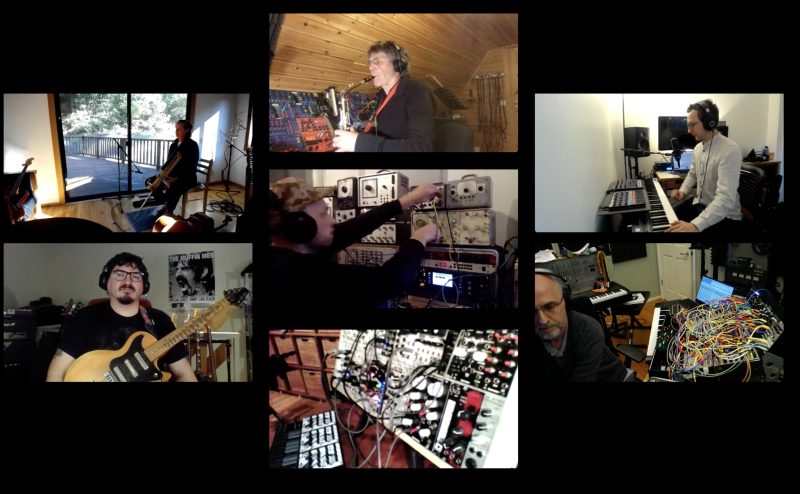Stanford musicians are using a streaming software from the ’90s to conduct high-quality concerts remotely — and to feel a sense of musical connection, even from far away.
“We listen to each other, we try to give space to each other and to harmonize with each other in some sense that really made us aware of our artistic and musical personalities,” said Constantin Basica D.M.A. ’18, a postdoctoral researcher at Stanford’s Center for Computer Research and Acoustics (CCRMA) who performs in weekly virtual concerts sponsored by CCRMA.
JackTrip, a software developed by music professor Chris Chafe D.M.A. ’83, has allowed six musicians to perform in virtual concerts throughout the pandemic. The most recent performance sponsored by CCRMA was on Sunday and featured musicians from California, Germany and Belgium. Broadcasted through Vimeo Live, the performers used JackTrip to ensure high quality sound streaming.
The virtual performance was the 31st in a series of “quarantine sessions” that began in April after COVID-19 made in-person performances nearly impossible. However, these performances were enabled by a software Chafe initially developed in the ’90s. JackTrip, which requires high-bandwidth internet connection, was then only available on college campuses and commercial establishments. But when the developers modified the software so that it could work effectively through home networks in April, amid the COVID-19 pandemic, Chafe felt it only natural to venture into this new environment for music-making.
According to Chafe, JackTrip’s high quality sound streaming contributes to each musician’s heightened sense of awareness of their own sound in the ensemble. Chafe added that the streaming allows the musicians to precisely create their sounds without worrying about interruptions or lags.
“All of the nuances of the instrument can get through,” he said, even the “small, breathy sounds.”
The musicians’ deep awareness of their own sound gives rise to musical patterns that create a sense of connectedness between the musicians, even in the virtual setting, Chafe said. He compared this phenomenon to the shift from an in-person conversation to one on Zoom: “You can only do turn-taking, so what becomes really important is the end of a phrase — how do you hand off the phrase to the next person?”
Somewhere during that process, “you lose the distance,” Chafe said. “You meet together somewhere — it’s not a physical place. It’s almost like teleportation.”
Chafe said that the group dynamic is extremely collaborative, whether musicians are playing together or in individual parts.
“It’s not hierarchical,” he said. ”Everybody’s individual parts, which might be independent, are also part of this thing — this network of thoughts.”
Still, even JackTrip can’t perfectly replicate an in-person experience. According to Chafe, because JackTrip only impacts audio quality, video feeds on Zoom still suffer from lags and glitches, meaning that musicians are forced to rely on the skill of listening.
“It’s all in the headphones,” Chafe said.
Basica echoed this sentiment.
“We listen more than we actually look at each other,” he said.
Beyond the “quarantine sessions,” JackTrip has broadened the possibilities for performers to connect with a wide audience. For instance, Basica has been organizing a festival in his hometown of Bucharest, Romania. The multi-dimensional performance includes blindfolding members of the audience and performing music live while also using a surround sound speaker system to broadcast the musicians across the world from Stanford.
Using JackTrip, Basica is able to merge the physical space of Bucharest with musicians at Stanford. The result: an immersive, panoramic auditory experience made possible by the technological capabilities of JackTrip.
“This is a big advantage of not having to travel,” Basica said. “It opens up new possibilities as a performer. That’s the kind of thing that got me excited [about JackTrip].”
JackTrip has also been used by Stanford organizations to connect jazz and classical ensemble groups and to carry out music lessons. 130 Jackstreamer units — kits required to use JackTrip — are currently in the hands of students and faculty, along with a set of 18 JackTrip servers running 24/7 at CCRMA which can mostly be used as “practice rooms.” Participants largely hail from the Stanford community or the Bay Area, but Chafe said JackTrip users can be found in Michigan and Texas, too.
Quarantine session performer Henrik von Coler of Berlin, Germany, said that peering into fellow musicians’ studios from the Zoom feeds feels oddly intimate.
“It is a funny feeling how you share this intimate space of your studio with the fellow musicians but also with the audience,” he said. “But we also got used to the small images on Jitsi or Zoom — you see the people in their very own space which feels familiar after a time.”
Contact Christina MacCorkle at cgmaccorkle ‘at’ gmail.com.
